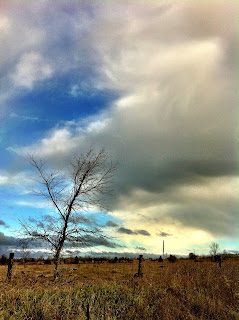
Angela writes:
It is raining and I contemplate with surprise how little of the Sandy storm made itself present for us here. Strange acting of calamity: for those in the middle of it, the world comes to a stop; for others, maybe not very far away, the same span of time is marked by some inconvenience.
Yesterday we walked along the trail and I got some breathtaking pictures of the sky above the county, without knowing clearly what those same clouds had brought with them somewhere else. Amazing what a little machine like the iPhone can grasp of the grandeur of such phenomena. Or is it that, to such grandeur, our means of intervention are secondary?
All that can be said at the sight of these pictures is, that I was there to witness it. Very little know-how went into the seizing of these cloud formations, except for my being prepared. If such renderings were ever to be properly printed, and presented in a public space, they could, I suppose, be called art. And yet the only artistry at work was that of natural elements at play.
Not long ago we had the visit of my cousin and her two children, grown up inquirers of all things worthy of inquiry. The topics addressed during their stay were numerous, yet the one which kept us awake overnight, believe it or not, was the question of art, and of who can call themselves an artist. Tudor, our lovely nephew, among many other things a dandy if one is yet to have survived the turn of the past centuries, wants to know. Not least because his sister Oana is an artist, who, like all such respectable fellows, bypasses the potential riches promised by lucrative endeavors like her brother's. Her brother, generous in turn, is ready to accept that an artist is one who makes art, even if they take a loss. For the sake of the argument, I contradict, and maintain that an artist can only call themselves such if they bring their work out in the open, to the public. By public of course I do not mean the immediate family, neither one's well intentioned friends and acquaintances, but rather people one does not know.
It is difficult for Tudor to accept that one who plays their bongos (his example) in the solitude of their home is not an artist in my definition. I say, they are not artists, but rather they play bongos. Just as I am not a painter, but rather somebody who sometimes paints. And so long as I will not expose a meaningful body of works, I will simply be one who spends some of her time in such a fashion.
From there, not surprisingly, at least not for me, we went on to speak about love and loss. Yes, this is how far the question of one's coming out with the fruit of their artistic expression took us. A question of definition again. Can love call itself such, if it is not built on the fear of the loss of the beloved? I ask. One condition too difficult to accept without putting up a vigorous struggle. And just like in the case of art, an unjust prerequisite. Why should anybody need the accord, or recognition, of anybody else than oneself, in order to keep doing what they enjoy, and which they cheerfully and freely may call art? For themselves alone to take or leave, for themselves to appreciate.
Likewise in love, the lover should be free to say, I love because I feel like it right now, and I will stop loving when this object will stop giving me what I expect.
Meanwhile, according to my position, neither is for me to take or leave. In art it would make such an occupation deserving of the name hobby. In love the take it or leave it rule makes the relationship a partnership of sorts. There is, of course, nothing wrong with that. I am tempted to say, that is, mostly and maybe rightfully, the form relationships take nowadays. As for love, where the one who loves is concerned with the needs and wants of the beloved, well, for better or for worse, such relationships are on the wane. Who would want to live one's life hanging on the affections of another than oneself?
Is this not what happens, when we take our art, whatever that may be, to strangers, and ask them what they think of it? It is a difficult place to be in, and in a world where self- sufficiency is the name of the most sought after condition, to depend on another's judgement, or passion, or compassion for that matter, is strictly unacceptable.
No wonder that a young and sensitive person may, sometimes, over such matters, loose sleep.


